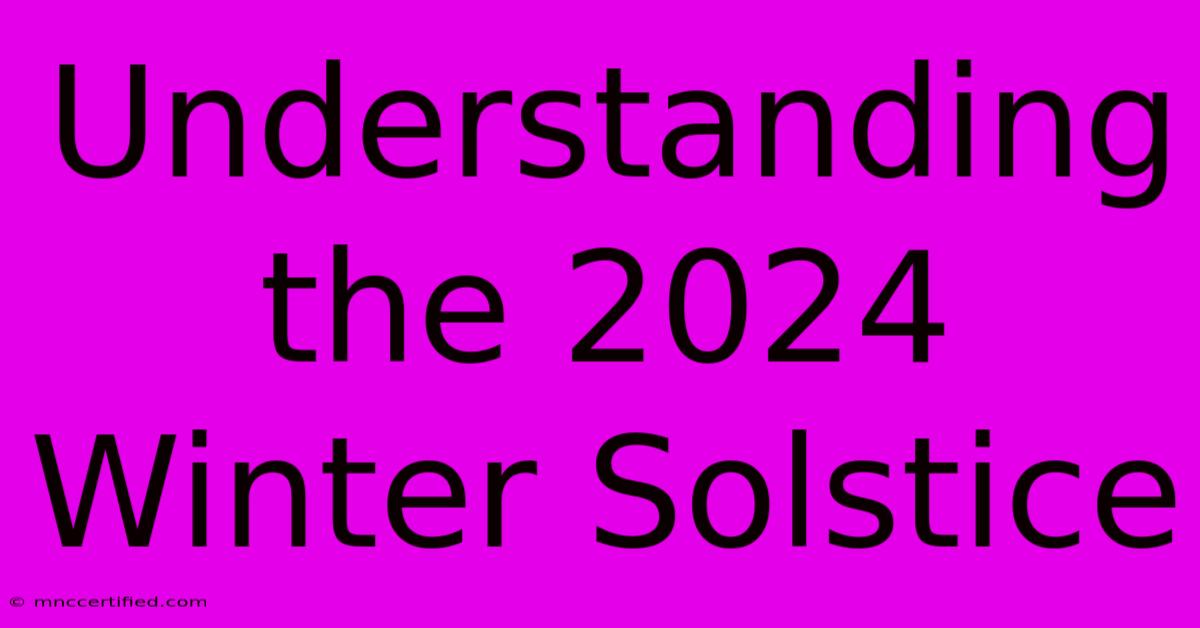Understanding The 2024 Winter Solstice

Table of Contents
Understanding the 2024 Winter Solstice: The Shortest Day of the Year
The winter solstice, a significant event in the astronomical calendar, marks the shortest day and longest night of the year in the Northern Hemisphere. In 2024, this celestial event will occur on December 21st. Understanding its meaning, significance, and the science behind it allows for a deeper appreciation of this fascinating phenomenon.
What is the Winter Solstice?
The winter solstice isn't just about the shortest day; it's a pivotal point in the Earth's yearly journey around the sun. It's the moment when the Earth's tilt on its axis is most inclined away from the sun, resulting in the least amount of direct sunlight reaching the Northern Hemisphere. This celestial event marks the official beginning of winter, astronomically speaking.
The Science Behind the Solstice
The Earth's axial tilt—approximately 23.5 degrees—is responsible for the seasons. As our planet orbits the sun, different parts of the Earth receive varying amounts of direct sunlight throughout the year. During the winter solstice, the Northern Hemisphere is tilted furthest away, leading to shorter days and longer nights. Conversely, the Southern Hemisphere experiences its summer solstice, experiencing its longest day and shortest night.
Cultural Significance of the Winter Solstice
Throughout history and across various cultures, the winter solstice has held profound symbolic importance. Many ancient civilizations celebrated this event with festivals and rituals, often focusing on themes of rebirth, renewal, and the return of the sun.
Ancient Celebrations and Traditions:
- Stonehenge: The alignment of Stonehenge with the winter solstice sunrise suggests its significance to Neolithic peoples.
- Yule: In many Northern European cultures, Yule is a winter solstice festival celebrated with bonfires, feasts, and evergreen decorations, symbolizing the promise of spring's return.
- Saturnalia: The ancient Romans celebrated Saturnalia, a week-long festival honoring the god Saturn, characterized by revelry and the temporary reversal of social norms.
Observing the 2024 Winter Solstice
While the exact moment of the solstice is a specific astronomical event, the shorter daylight hours are noticeable for several days surrounding December 21st. Consider these ways to observe and appreciate the winter solstice:
Ways to Experience the Solstice:
- Sunrise/Sunset Viewing: Witness the sunrise or sunset on or around the solstice date. Note the low angle of the sun on the horizon.
- Nature Walks: Enjoy the winter landscape, appreciating the stillness and beauty of the season.
- Reflection and Intention Setting: Use the symbolic power of the solstice as an opportunity for self-reflection and setting intentions for the new year.
- Community Celebrations: Participate in local solstice events or festivals in your area. Many communities host gatherings to mark this special time of year.
The Winter Solstice and the New Year
The winter solstice is not only the shortest day but also a powerful symbol of transition and hope. The lengthening days that follow represent the slow but sure return of sunlight and warmer weather, mirroring the hope and renewal felt by many cultures celebrating this time. As we approach the end of the year, the winter solstice invites us to reflect on the past and look forward to the new year with renewed energy and optimism.
SEO Considerations:
Keywords: Winter solstice, 2024 Winter Solstice, shortest day, longest night, December 21st, astronomical event, Earth's tilt, seasons, cultural significance, ancient celebrations, Yule, Saturnalia, Stonehenge, solstice traditions, observing the solstice, winter solstice celebrations, new year, rebirth, renewal, hope, transition.
On-Page Optimization: The article uses keywords naturally throughout the text, in headers, and in the meta description (not shown but should be included).
Off-Page Optimization: Promote the article through social media sharing, guest posting on relevant websites, and link building from authoritative sources. Consider targeting relevant forums and online communities related to astronomy, paganism, and cultural celebrations. A well-structured article with engaging content naturally attracts backlinks.

Thank you for visiting our website wich cover about Understanding The 2024 Winter Solstice. We hope the information provided has been useful to you. Feel free to contact us if you have any questions or need further assistance. See you next time and dont miss to bookmark.
Featured Posts
-
Crypto Integration Into Mainstream
Dec 21, 2024
-
Find Mufasa The Lion King Online
Dec 21, 2024
-
Winter Solstice 2024 Meaning And Significance
Dec 21, 2024
-
Slater Jay Divorce Wifes Public Statement
Dec 21, 2024
-
Microneedle Devices Pharmas Future
Dec 21, 2024